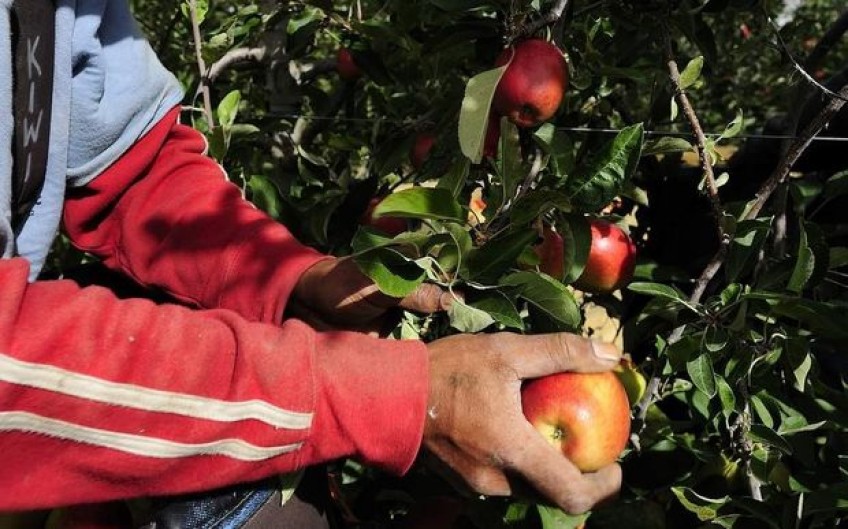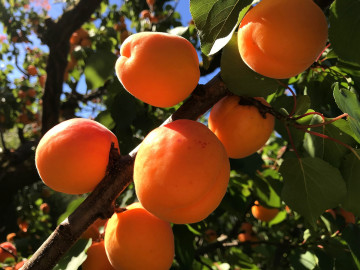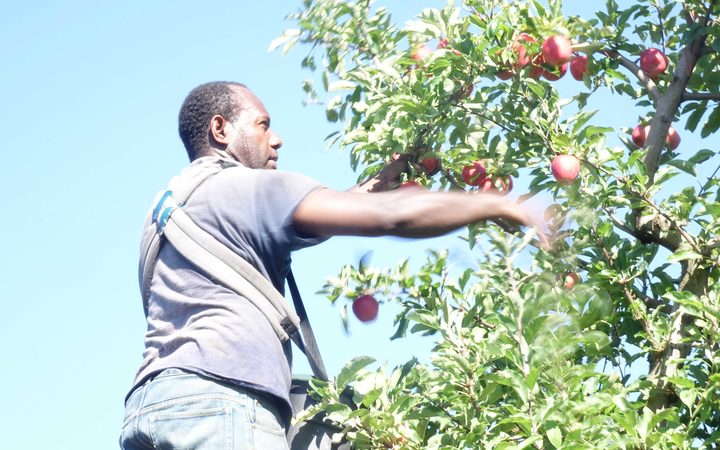Students and pensioners to fill fruit picking vacancies

An army of students and grey nomads is being recruited to work in Central Otago for what’s looking to be a bumper season but, with Covid restrictions preventing overseas workers from returning, some fruit may remain unpicked.
Recruiters have been targeting university students, high school pupils and retirees to help fill a labour shortfall in the district, and a campaign encouraging locals to provide space to accommodate them is gaining traction.
But skilled workers leave tough shoes to fill, and students need to head back to study in the New Year before work dries up for the season.
Cromwell orchard owner and Central Otago Fruitgrowers Association chair Trudi Webb says apricot thinning has started and, for now, there’s enough people around.

More skilled workers are needed to get a predicted bumper crop picked this season.
Pressure points will be early January, when the season really kicks in, and February, when students return to school and there’s still summer fruits to be picked and the apple and grape harvests begin, she says.
Plus, a fresh-faced workforce, though providing numbers, poses unique challenges.
At the end of October, the Central Otago Recovery Response group, tasked with helping the district build resilience in the face of Covid’s chaos, launched its “Spare Time, Spare Room” campaign.
It targets locals, and their family and friends from out of the district, to be a solution to the predicted seasonal labour shortage.
Rolling up sleeves to help out here and there isn’t the intent, though – newbies to the industry need to be trained up and committed for a stint of regular work, Mrs Webb says.
“Growers understand they need to be flexible this year and we are talking to them about thinking outside the square.
“However, it still needs to be manageable onsite, so people are safe, crops are picked to the standard required for exporting and compliance requirements are met.”
An easy way for locals to make a tangible difference to the season ahead is to offer up a spare room to house out-of-town workers, she says.
Many growers have simple onsite accommodation, but with a different cohort of people being employed, different options of places to stay are needed.
“We have people concerned in our community that we aren’t going to get our fruit off and wondering how they can help, which is amazing. This is definitely one way the community can help us.”
Industry recruiter Seasonal Solutions Cooperative has set up information stands at university campuses across the country, as well as at a New Zealand Motor Caravan Association expo, in an attempt to entice would-be workers to Central.
Chief executive officer Helen Axby says the industry has been struck by a “double whammy” as Covid border closures have resulted in dwindling numbers of skilled Pacific workers and international backpackers on working holiday visas, a bulk of the industry’s seasonal staff.
“Some fruit may not be harvested – and this is looking as though it will be a bumper harvest, although nobody likes to speak too soon.”
Workers from the Pacific enter the country under the Recognised Seasonal Employer scheme, and there are now only approximately 120 of them remaining in the district.

Central Otago growers and local government representativies continue to lobby Government to open the border to skilled seasonal workers from the Pacific (Photo RNZ).
It’s a lose-lose situation – growers are floundering without the expertise of experienced staff, and RSE workers stranded in the islands are losing vital income, Ms Axby says.
“Their economy has been decimated by the lack of tourists and they are pleading to return as soon as possible.”
And, growers have expressed a willingness to sponsor quarantine requirements if RSE workers are given greenlight to return – watching sports people, entertainers and deep-sea fishing crews allowed in while horticulture and viticulture workers are not deemed “essential” is frustrating, Ms Axby says.
“Horticulture and viticulture across New Zealand is going to be a critical part of post-Covid recovery and that needs to be recognised.”
While recruiters continue to work closely with the Ministry of Social Development to fill gaps with willing Kiwi workers, there remains a shortage of workers across the board, Ms Axby says.
“We hope that the new Government will show some compassion and understanding.”
In response to questions from Crux, Andrew Craig, who’s responsible for immigration policy at the Ministry of Business, Innovation and Employment, says employers from the horticulture and viticulture industries are asking for border exemptions for RSE workers to support the upcoming harvest.
It's a decision that will be made by a group of Government Ministers with advice from cross-agency officials led by the ministry, and no decisions have been made at this point, he says.

At stake: 10 percent of Central Otago's GDP, plus the countless other flow-on benefits that come from a thriving industry, says CODC economic development manager Nick Lanham.
Central Otago District Council economic development manager Nick Lanham has helped lobby Wellington to enable the right policy conditions so international workers already in the country can stay and work.
Steps have been taken: RSE workers in New Zealand have been able to extend stays, those with expiring working holiday visas can stay on and work the fruit season, and other visa holders can take up seasonal harvest work if offered it, when jobs can’t be filled by Kiwis.
Along with industry representatives, council will continue to push decision-makers to allow regular RSE workers from COVID-free Pacific Island nations to be brought in, as there is much at stake, Mr Lanham says.
“Growers invest in their orchard or vineyard all year round for an earning period that could be as sort as a couple of weeks, so it is crucial that the harvest happens.
“Horticulture directly accounts for an estimated 10 percent of Central Otago’s GDP with the total contribution to our economy being even larger if you were to take into account the flow-on effects.”
Have room to spare? Check out The WAN (Workforce Accommodation Network), an online platform set to launch in December to match seasonal workers to those willing to accommodate them.
Keen for a working holiday in Central Otago this summer? Discover what it takes to be a seasonal employee here.

























